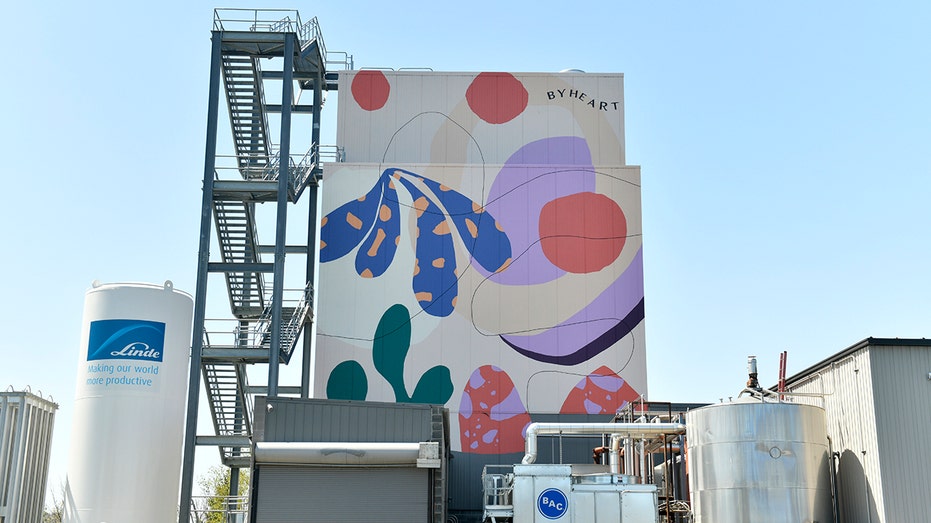Baby formula maker fills supply gap
Baby formula maker ByHeart has avoided supply chain disruptions and kept supplies available because it relies on its own manufacturing
ByHeart providing customers with baby formula despite nationwide shortage
ByHeart CEO Ron Belldegrun discussed the baby formula shortage and being a part of the solution with FOX Business' Lydia Hu.
While the U.S. is likely months away from seeing more baby formula back on the shelves, one company is looking to help fill the gap.
New York-based ByHeart debuted its baby formula on March 23 amid the perfect storm following a pandemic, an ingredient shortage driven by the war in Ukraine and a recall from a market share leader in the country, Abbott Nutrition. About 43% of baby formula is sold out across the country, according to data from Datasembly.
HOUSE APPROPRIATIONS COMMITTEE PREPS $28M EMERGENCY BILL TO ADDRESS BABY FORMULA SHORTAGE
Yet, the baby formula maker has avoided supply chain disruptions and kept supplies available because it relies on its own manufacturing and doesn’t outsource. Unlike other smaller and newer formula brands that are struggling to ramp up production, ByHeart has acquired its own manufacturing facility in Reading, Pennsylvania, after pursuing clinical trials and becoming the first formula maker to be registered with the FDA in fifteen years.

A view of the ByHeart infant formula facility during the ByHeart infant formula facility ribbon cutting on April 28, 2022 in Reading, Pennsylvania. (Eugene Gologursky/Getty Images for ByHeart / Getty Images)
"What we didn’t realize is five years later, how important that decision to vertically integrate and own our entire supply chain would be in enabling us to be part of a solution now to this national crisis," Ron Belldegrun, CEO and co-founder of ByHeart told FOX Business.
Amid the growing crisis, the Biden administration is aiming to offer temporary relief by increasing imports from overseas. Despite coming to an agreement to resume production, Abbott anticipates six to eight weeks before new products begin arriving in store.
Belldegrun told FOX Business that part of the solution to the ongoing shortage is to increase manufacturing at home, as well as invest more into current manufacturers.
Right now, only four manufacturers make up nearly 90% of the market space: Abbott Nutrition, Nestle USA, Perrigo Co. and Mead Johnson Nutrition, according to Brian Dittmeier, senior director of public policy at the National WIC Association. Meanwhile, just 2% comes from imports from Mexico, Chile, the Netherlands and Ireland. Abbott’s market share alone exceeds 40% and provides many U.S. states with supply for programs that bring nutritional assistance to low-income households.
Stocks In This Article:
BABY FORMULA BY THE NUMBERS: FACTS ABOUT THE MULTIBILLION DOLLAR INDUSTRY
"The infant formula manufacturing sector needs to be more resilient, with increased competition and diversification of manufacturers' operations," Dittmeier told FOX Business.
Regulatory hurdles and high costs are preventing many start-ups from entering the industry, as the process and conditions must meet strict sanitation and nutrition standards. Infant formula is the only food that requires clinical trials, product registration and vetted manufacturing, which means a lengthy road to achieving innovation success.
GET FOX BUSINESS ON THE GO BY CLICKING HERE
"Balancing speed to fix the issue in front of us with ensuring the highest standards of food safety and quality needs to be the number one priority because this is a category where we cannot make mistakes," Belldegrun said.
Belldegrun and co-founder, Mia Funt, are facing surging demand for their products as many consumers scramble for alternative options. Their online platform has seen purchasing levels up 15 times higher than their first full-year projection.
To keep up with demand, ByHeart is ramping up operations from 24 hours a day, five days a week to 24/7, adding a new shift at the plant and hiring more employees.




















